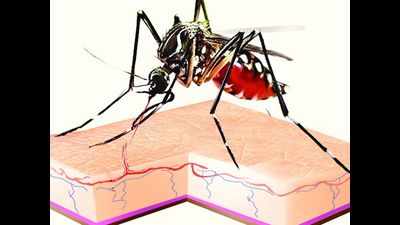Trending
This story is from December 15, 2018
Pune: With 108 patients, Japanese encephalitis spreads beyond the endemic zone

(Representative image)
PUNE: Mosquito-borne viral disease Japanese encephalitis has emerged as a potential threat in Maharashtra this year with dengue and chikungunya.
The state has recorded 108 cases of the disease, mainly in endemic districts, in the past 11 months as against 30 recorded throughout 2017. Culex mosquito, which feeds on animal blood, especially pigs, is the main vector of the disease.

“Of the 108 Japanese encephalitis (JE) cases diagnosed in Maharashtra so far this year, six were symptomatic and needed immediate treatment for the viral infection.The remaining 102 cases were detected during fever surveillance undertaken in the affected areas. But these patients were not symptomatic and didn’t need treatment,” state entomologist Mahendra Jagtap told TOI.
The other 102 patients in whose blood samples the JE virus was picked up during door-to-door fever surveillance did not develop any illness despite being exposed to the virus. They were from Gadchiroli, Bhandara, Chandrapur and Thane districts. “Of them, Gadchiroli reported the maximum 43 JE cases,” Jagtap said.
Officials conduct door-to-door visits and rapid fever survey in areas where patients with JE are detected.
Experts claimed that the mosquito-borne virus seems to have adapted and spread to areas outside its endemic zone. “The detection of JE patient in Aurangabad and Thane underlined the spread of the virus. It is a cause for concern and indicates that the virus is circulating in a wider geographical area,” said another state health official, requesting anonymity.
In addition to the 11 districts in the Vidarbha region where JE is endemic, the state had for the first-time reported cases in Pune in 2016 and 2017. A nine-year-old boy died of the disease in Solapur in 2017. This was the first time in western Maharashtra that cases of JE were detected.
Medical experts stressed the emergence of JE virus should be looked upon as a warning sign and doctors should keep a high index of suspicion to identify the viral disease. Paediatrician Jayant Joshi, former president of IAP, Pune, said, “Every case of fever with encephalopathy (brain inflammation) should be probed for JE. Screening of patients visiting the endemic areas also needs to be done to rule out the possibility of the disease.”
An infectious disease expert said, “Cases of viral encephalitis occur all year round, but we may be underdiagnosing JE as the test availability is not widespread.”
Clinically, signs and symptoms of JE cases are similar to those of viral encephalitis. Symptoms, depending on the severity, can include headache, fever, disorientation, meningeal signs, coma, tremors, paralysis (generalized), hypertonia and loss of coordination.
The JE surveillance system, experts say, should be improved to better understand the drivers of the disease expansion for instituting a robust control programme.
The state has recorded 108 cases of the disease, mainly in endemic districts, in the past 11 months as against 30 recorded throughout 2017. Culex mosquito, which feeds on animal blood, especially pigs, is the main vector of the disease.

“Of the 108 Japanese encephalitis (JE) cases diagnosed in Maharashtra so far this year, six were symptomatic and needed immediate treatment for the viral infection.The remaining 102 cases were detected during fever surveillance undertaken in the affected areas. But these patients were not symptomatic and didn’t need treatment,” state entomologist Mahendra Jagtap told TOI.
The six patients reporting severe illness were from the endemic region of Vidarbha, including Gadchiroli and Wardha. Out of the endemic belt of Vidarbha, health officials detected one JE case each in Aurangabad and Thane this year.
The other 102 patients in whose blood samples the JE virus was picked up during door-to-door fever surveillance did not develop any illness despite being exposed to the virus. They were from Gadchiroli, Bhandara, Chandrapur and Thane districts. “Of them, Gadchiroli reported the maximum 43 JE cases,” Jagtap said.
Officials conduct door-to-door visits and rapid fever survey in areas where patients with JE are detected.
Experts claimed that the mosquito-borne virus seems to have adapted and spread to areas outside its endemic zone. “The detection of JE patient in Aurangabad and Thane underlined the spread of the virus. It is a cause for concern and indicates that the virus is circulating in a wider geographical area,” said another state health official, requesting anonymity.
In addition to the 11 districts in the Vidarbha region where JE is endemic, the state had for the first-time reported cases in Pune in 2016 and 2017. A nine-year-old boy died of the disease in Solapur in 2017. This was the first time in western Maharashtra that cases of JE were detected.
Medical experts stressed the emergence of JE virus should be looked upon as a warning sign and doctors should keep a high index of suspicion to identify the viral disease. Paediatrician Jayant Joshi, former president of IAP, Pune, said, “Every case of fever with encephalopathy (brain inflammation) should be probed for JE. Screening of patients visiting the endemic areas also needs to be done to rule out the possibility of the disease.”
An infectious disease expert said, “Cases of viral encephalitis occur all year round, but we may be underdiagnosing JE as the test availability is not widespread.”
Clinically, signs and symptoms of JE cases are similar to those of viral encephalitis. Symptoms, depending on the severity, can include headache, fever, disorientation, meningeal signs, coma, tremors, paralysis (generalized), hypertonia and loss of coordination.
The JE surveillance system, experts say, should be improved to better understand the drivers of the disease expansion for instituting a robust control programme.
End of Article
FOLLOW US ON SOCIAL MEDIA










